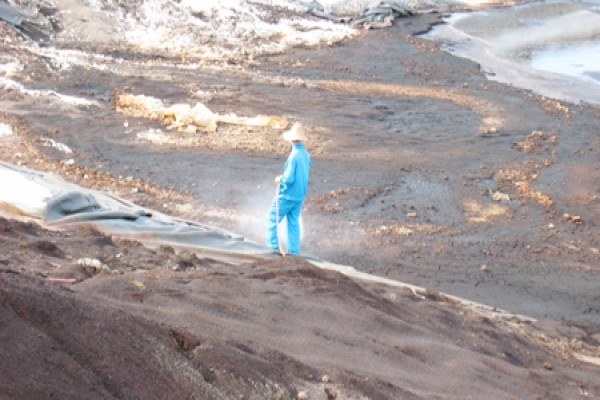Garbage deodorants have the function of turning waste into treasure
Garbage is a mixture of miscellaneous components, and a lot of accumulated waste on the soil surface will undergo chemical reactions, release harmful gases, cause soil pollution, and even air pollution. The use of waste deodorants can greatly reduce the degree of soil pollution and achieve a completely odorless effect over time.
During the transportation and outdoor accumulation of garbage and waste, organic matter undergoes a foul odor and releases a lot of pollutants such as ammonia and sulfides into the atmosphere. There are over 100 types of organic evaporative gases contained in these released substances, which contain many carcinogens and teratogens. Plastic film, paper scraps, and dust fly with the wind to form "white pollution", and waste odor pollution will present a hazy climate. In addition, waste contains many harmful bacteria, which can easily breed organisms such as flies, mosquitoes, beetles, and mice, and can easily spread pathogens, affecting the health of nearby residents.

Bacteria in waste, heavy metals dissolved during erosion, and other pollutants entering the ground can constitute water pollution. Additionally, the collection of waste requires local authorities, which can occupy a significant amount of land and hinder its effective utilization. The concentration of waste may also generate flammable and explosive gases such as methane, presenting a risk phenomenon of waste explosion.
In summary, the seriousness and urgency of the waste issue are evident. To turn these wastes into treasures, the first step is to deal with the odor of the waste, use waste deodorants for spraying, and achieve the deodorization effect. The next step is to do a good job in recycling and utilizing the waste. Recycling 1 ton of waste paper can produce 800 kilograms of paper, reduce the cutting of 17 large trees, save more than half of paper making power, and reduce water pollution by 35%; 1 ton of waste plastic can be recycled to at least 600 kilograms of gasoline and diesel; Using waste glass to regenerate glass can not only save materials such as quartz sand and soda ash, but also save electricity; Exercising metal with scrap metal can save a lot of power consumption and reduce air pollution; Some kitchen wastes, such as peel, eggshell, vegetable leaves and leftovers, can be treated by composting and fermentation to become fertilizer.
The article originates from a deodorant manufacturer http://www.scneng.com.hk
-
06-11
"Environmental Doctor" Du Siyuan: Environmental Protection is a Lifestyle Attitude
There is a Hong Kong compatriot in Jiangmen who often frequents various farms and plantations, walks in mechanical factories, and is seen by others as the nemesis of environmental problems. He conside
-
03-16
Deodorant manufacturer: Deodorants reduce soil pollution
Waste is a chaotic mixture of various components. The accumulation of debris on the surface of soil can cause some chemical reactions, releasing harmful gases, which can lead to soil pollution and eve
-
12-01
Deodorant Manufacturers: Differences between Microbial Deodorants and Traditional Deodorants
The waste that is not needed in our daily life and work is called waste. Due to the large amount of waste discharged and the complex categories, there are great difficulties in reducing waste and deod
-
11-08
Application of Deodorant Manufacturers in Domestic Waste Treatment
Garbage is the waste generated in everyone's daily life and work. Due to its large discharge volume and complex and diverse composition, it poses great difficulties in reducing and deodorizing wa
